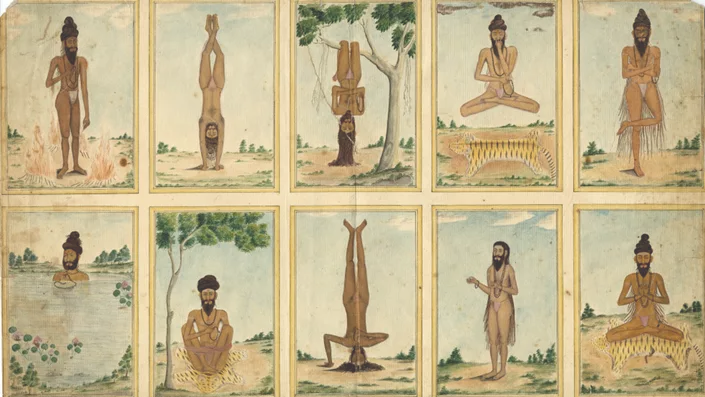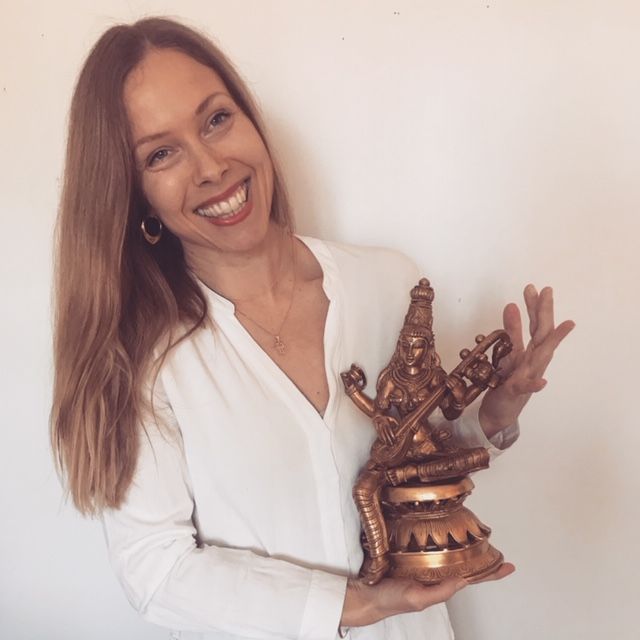
The History, Philosophy and Mythology of Yoga
a course on the intersection of traditional and contemporary practice, of theoretical knowledge and embodied wisdom
This is a ground-breaking theoretical education that strives to unite academic knowledge and embodied wisdom; to join a critical mind with a devotional heart. It is aimed at yoga teachers or curious practitioners who want to deepen their understanding of the yogic tradition (or more correctly; traditions) and know more (a lot more) about the philosophical systems and the mythological stories they contain.
The course offers an overview of the history of yoga and why it is far more complex than it is often portrayed. As a student, you will learn to see the differences and similarities between the various philosophical schools that are often carelessly referenced to in the contemporary yoga world and understand how they relate to the texts frequently studied in teacher trainings, e.g. Patañjali's Yoga Sūtra.
You will also get to study texts that you may not be familiar with but which are guaranteed to influence how you practice yoga. Not to mention all the wonderful, wisdom-filled myths!
Taught by a scholar-practitioner who offers a unique combination of clear-sighted criticism and devotional depth, this course wishes for you to reflect upon the traditional teachings of yoga with an understanding of their original context, in the light of contemporary practice, and with a willingness to taste what they actually have to offer! This is thus far more than an academic education (even though efforts have been made to refer the most advanced and credible research in the field). The intention is ultimately not only to provide information, but to offer the knowledge that is nourishing, perhaps even liberating.
The course consists of 7 modules:
* The Historical Development of Yoga. What is Yoga and for whom? What does contemporary research say about the origins of Yoga? What has been the goal of the practice throughout the ages? Review of the many definitions of Yoga (as a method and a state), the concepts of liberation (mokṣa, kaivalya, jīvanmukti), and the differences between Classical Yoga, tantric Yoga and Haṭha Yoga.
* Yoga Philosophy. What do we even mean by this term? Review of the major philosophical systems often referred as "Yoga Philosophy", above all Sāṃkhya and Vedānta and the value of knowing the slightly deeper, philosophical background to the techniques or text fragments often used when teaching contemporary yoga.
* Patañjali's Yoga Sūtra - Historical Context and Practical Application. How did an advanced meditation manual become an integral part of the Western Yoga canon? We place the text in its historical context and study the breadth of translations and interpretations it has undergone. Review of ethical principles (Yama and Niyama), the concept Rāja Yoga and Swami Vivekananda's, as well as T. Krishnamacharya's part in spreading Yoga to the West.
* Bhagavad Gītā - the Song of the Blessed One. We study the text as part of the world's greatest epic - the Mahābhārata. Review of the concepts Jṇāna Yoga and Karma Yoga. We also speak about Yoga as a political tool or an urging for activism.
* Rāmāyaṇa - the Hero's Journey. How can we interpret the mythological journey of Rāmā, Sītā and Hanumān? Review of Bhakti Yoga and devotion as a method for reaching liberation.
* Devī Māhātmya - the Glory of the Goddess. Review of the Śakta Tantra tradition, the importance of female deities (such as Kālī and Durgā) from a yogic, historical and feminist perspective, and the meaning of kuṇḍalinī.
* Vijñāna Bhairava Tantra - the Wisdom that Comes Through Experience. We practice a string of somatic meditation techniques from the tantric tradition and listen to the foundational tantric story of Śiva and Śakti. Basic review of tantra and the differences between "classical" and contemporary forms and expressions of tantra.
The course ran live through zoom in the autumn of 2023 and is now available for self-study.
Participants have access to all recording for a lifetime.
Your Instructor

Tova Olsson is a scholar of religion, author and yoga teacher with over 20 years of experience in educating. She is appreciated for her deep knowledge, her ability to explain esoteric ideas and philosophical concepts in an accessible way, for her skillful storytelling and humorous approach. As a scholar-practitioner, she strives to combine academic, critical understanding with the dedicated experience of a long-term practitioner, offering courses that provide liberating knowledge - on many different levels.
Course Curriculum
-
StartText document: The History of Yoga- or a brief overview of the human longing for liberation
-
StartThe Historical Developments of Yoga lecture, part 1 (video) (81:45)
-
StartThe Historical Developments of Yoga lecture, part 1 (audio)
-
StartThe Historical Developments of Yoga lecture, part 2 (video) (44:51)
-
StartThe Historical Developments of Yoga lecture, part 2 (audio)
-
StartPowerpoint
-
StartReflection
-
StartText document: Yogic Philosophy- from Veda and Vedānta to Sāṃkhya and Śaiva Tantra
-
StartYogic Philosophy lecture, part 1 (video) (69:42)
-
StartYogic Philosophy lecture, part 1 (audio)
-
StartYogic Philosophy lecture, part 2 (video) (57:07)
-
StartYogic Philosophy lecture, part 2 (audio)
-
StartText document (the Tattvas- according to Kashmir Śaivism)
-
StartPowerpoint
-
StartReflection
-
StartText document: The Yoga Sūtra of Patañjali- a historical overview of text and myth
-
StartThe Yoga Sūtra's historical background lecture (video) (62:16)
-
StartThe Yoga Sūtra's historical background lecture (audio)
-
StartThe Yoga Sūtra- practical application lecture (video) (56:49)
-
StartThe Yoga Sūtra- practical application lecture (audio)
-
StartPowerpoint
-
StartReflection
Frequently Asked Questions
Welcome to Saraswati Studies - where we celebrate the knowledge that liberates!